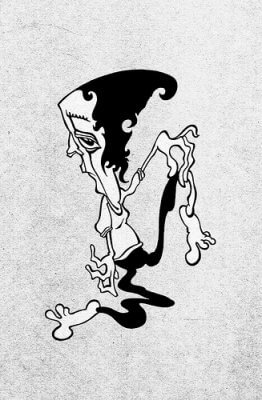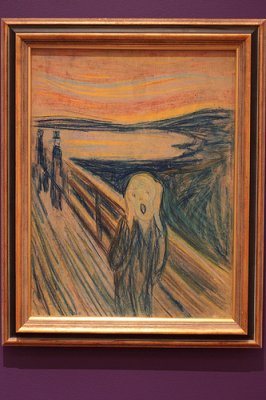Depression and Creativity – Connected, or a Myth?

By: Shareheads
by Andrea M. Darcy
Depression and creativity, and creativity and mental health in general, have been linked as far back as Aristotle. He raised the question,“Why is it that all men who are outstanding in philosophy, poetry, or the arts are melancholic?”
And we have Van Gough’s ear as the morbid symbol of this connection, lest one would dare try to challenge it.
But is there actually any evidence that creativity causes depression? Or depression causes creativity?
[Not sure you are or aren’t depressed? Take our free stressed or depressed test.]
Are creative people really born more depressed?
First let’s state the obvious – not all people who suffer from depression are creative.
And many people who are creatively successful are not depressed, but they are unlikely to get the same attention as a writer who sticks her head in an oven with her children in the next room (Sylvie Plath).
This said, research does point to the fact that creative people might be more prone to depression.
Research looking at all the studies around depression and creativity show up to 18 times the rate of suicide in creative types compared to the general population, up to ten times more depression, and up to twenty times more manic-depression.
[Are you suffering from depression or suicidal urges? Would you like to try talking to someone? Book online or phone therapy appointment quickly and easily wherever you are in the world using our new platform, harleytherapy.com].
But does creativity cause depression?
Maybe not.
There is some interesting research showing that it’s not creativity itself that causes depression. But the symptoms that lead to depression might also lead to creativity.
To be creative and find new and interesting solutions we need to think a lot. Going over things again and again in our minds is called ‘rumination’. And rumination leads to depression when we are having negative thoughts or are self-critical.
So being a thinker, the very thing that means one is more prone to creativity, might also be the very thing that makes one more prone to depression.
Does depression cause creativity?

By: Solis Invicti
And what about the reverse? Is it true that to create good art we ‘need’ to be depressed?
Depression, again, involves rumination. Eventually the rumination can lead to revelations, or the depression can just end. Both the relief and the excitement over the new level of understanding can cause a burst of energy. And researcher Kay Jamison found that it was this energy burst that follows depression that can cause creative output, not the depression itself.
In fact another study found that receiving a gift lifted people’s moods causes creativity, demonstrating the same principle. A quick lift in mood seems to leave our minds more open to good ideas, whether we go through depression to get that mood lift or have something good cause it.
So yes, depression and creativity are linked, but one does not cause the other.
Can creativity help you if you are depressed?
Forms of psychotherapy now exist just to use creativity to help with mental health. Art therapy and dance therapy use creativity to help clients source and process emotions and experiences they might otherwise struggle to verbalise.
Writing is also a well-known tool for processing the unconscious mind.
“Writers get to treat their mental illnesses every day,” Kurt Vonnegut is quoted as saying. And a recent survey of writers found that 10% found it to be therapeutic.
Creativity often involves making things. When it’s an activity, such as knitting, making music, and doing digital design, we are moving our attention away from just our thoughts, which can help stop rumination. A study of almost 700 university students found better moods in the days the students practiced a creative activity.
An interesting neurological condition called aphantasia means that sufferers cannot create mental images, and it can cause relating difficulties and depression. Interestingly many sufferers end up artistic, creating on paper or in words what they can’t create in their mind’s eye.
How can you use creativity to help your depression?

By: Jesse Wagstaff
Write it out.
Many people find journalling incredibly helpful for mood management. If you find it awkward to write about yourself, what happens when you turn yourself into a character and write out scenes?
Make bad art.
Sit down with the intention of doing the worst painting or drawing you can (nobody needs to see it after) and let yourself really go for it. Not only might you release some emotions, you can work on dropping your need to feel perfect, which can help raise self-esteem.
Dance with nobody watching.
Exercise has been shown to elevate mood, and you will also have a moment of creativity. Don’t believe it? Close the curtains, dance around the living room for a minimum of 15 minutes to your favourite songs, then decide.
Try something new.
Creativity doesn’t need to mean becoming an artist. It can be making a song with an app, learning to knit, or cooking without a recipe. Remember, daily creative moments lift mood.
What can we learn from the link between depression and creativity?
In the time of Aristotle and afterwards, melancholy, or what we now call depression, was not seen as a bad thing. It was seen as one side of a gift, the gift of creativity and genius, and a necessary element of greatness.
And yet today, depression (a far less romantic word than ‘melancholia’ to begin with) is seen as an ‘illness’ that people ‘suffer’. And there is still, despite recent progress, stigma against those who experience depression.
What would the world look like if we stopped judging people for being sad? What would the process of being sad look like if we no longer had to be ashamed about it? And how many great artists would still be with us if they were not made to feel ashamed of their gift of deep thought and experiencing?
How can you begin to challenge your own concepts of mental health? And how can you take more responsibility if you are suffering from low moods? Is it time to try counselling?
Harley Therapy connects you with friendly, highly experienced therapists in central London locations. For affordable counselling worldwide, please visit our sister site harleytherapy.com to book therapy by online, phone or in person with our qualified, professional counsellors and psychotherapists.
 Andrea M. Darcy is a mental health and wellbeing expert with training in person-centred counselling and coaching. She often writes about trauma, relationships, and ADHD, and works as a consultant helping people plan their perfect therapy journey. Find her on Instagram @am_darcy
Andrea M. Darcy is a mental health and wellbeing expert with training in person-centred counselling and coaching. She often writes about trauma, relationships, and ADHD, and works as a consultant helping people plan their perfect therapy journey. Find her on Instagram @am_darcy





Hi, I writing a research thesis and using this blog as a reference, Can you please tell me the name of this writer wrote this blog post,
Depression and Creativity – Connected, or a Myth?
Hi there, we use a lot of ghost writers. so it would simply need to be quoted as ‘Harley Counselling Blog’.